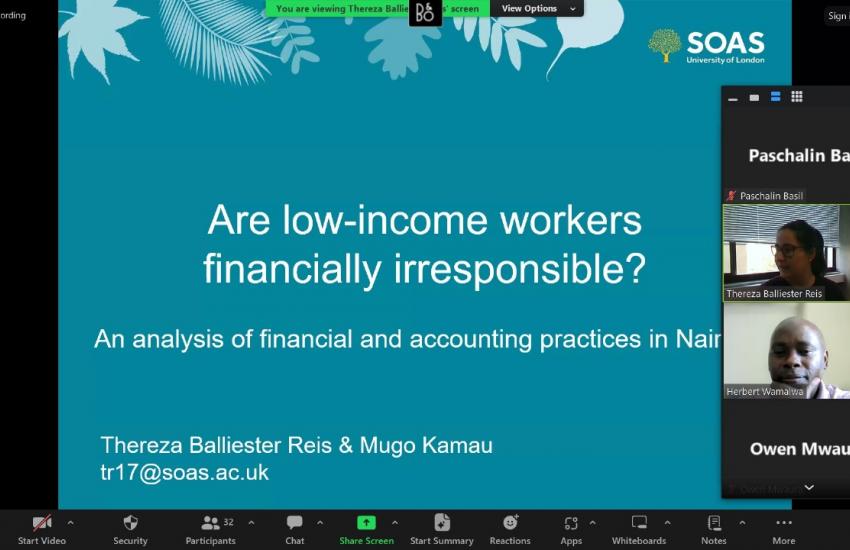IDS Seminar on Financial Inclusion and Responsibility
The Institute for Development Studies (IDS) held the second seminar of the year on 1st February 2024, from 2.00 pm to 3.30 pm EAT. The presenter was Dr. Thereza Balliester Reis, a Lecturer of Economics at SOAS, University of London. Her research interests are financial inclusion, over-indebtedness, poverty, and inequality in the Global South. Her work applies both quantitative and qualitative methods. She is currently working on a research project about financial inclusion in Nairobi, funded by the BA/Leverhulme Small Research Grant (2022-24).
The discussant was Dr. Radha Upadhyaya, a Research Fellow at the Institute for Development Studies - UoN. She has deep financial sector expertise as a qualified CFA charter holder, a former bank director, and PhD research on the banking sector in Kenya. Dr. Radha has a PhD and MSc from SOAS, University of London, and a BA from the University of Cambridge.
Dr. Balliester started the session by giving the context of the research, the theory and the method that was used, and the findings of the same. The findings relate to “irresponsibility” and financialization processes. She said many studies focus on the financial literacy aspect of financial inclusion and individual financial responsibility. The study believes there is an inappropriate focus on financial literacy in the global south where there are a lot of social and financial system characteristics that most of the come from the West. In addition, there is a discrepancy in how financial literacy is measured, as it does not consider the Global South context. The two research questions that the paper addressed were:
- Is a quantitative-driven financial literacy measurement sufficient to capture individuals’ knowledge of complex financial systems?
- What is the relevance of socio-economic constraints for indebtedness and individual financial responsibility?
The paper’s abstract reads as below:
“Studies on financial inclusion place strong emphasis on financial literacy and individual financial responsibility. Over-spending and over-indebtedness are often thought to be consequences of a lack of understanding of prudent budgeting, saving, and investment. Building on the critical accounting and everyday financialization literature, this study challenges those claims. By interviewing 30 low-income workers in Nairobi, Kenya, we find that many are highly financially literate and have extensive knowledge on how to save on transaction costs and to select optimal borrowing opportunities. In fact, participants report several new techniques to save on costs, such as splitting transactions on M-Pesa to avoid fees. Yet, as their income is low, those individuals often find themselves indebted over sustained periods, particularly for basic needs such as food and transport. Furthermore, where individuals select costly financial services or are unable to save for the future, these seem to be consequences of structural and income constraints rather than a lack of understanding of accounting practices. Taken together, our article critiques established understandings of financial knowledge by presenting new evidence on everyday financial practices in Nairobi. Our results suggest that financialization of everyday life has spread to countries beyond the Global North and might have severe consequences for development goals.”
Dr. Radha, the discussant, commended the paper as very topical and one that contributes to studies on financialization in the Global South. She suggested that there is a need to have a clear definition of financialization, link the literature review more clearly to historical microfinance debates, and include a heterodox understanding of financial capabilities such as Storchi & Johnson (2016).
She added that the first research question could be tweaked, as it is, it seems to imply that quantitative measurement of financial literacy is not useful.


